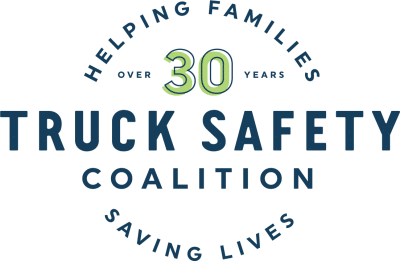Joint Press Conference Statement of Joan Claybrook, Chair, Citizens for Reliable and Safe Highways (CRASH) and former Administrator, National Highway Traffic Safety Administration (NHTSA)
Truck Safety Coalition & Advocates for Highway & Auto Safety
Tuesday, June 15, 2021
Good afternoon. I am Joan Claybrook, Chair of the Board for Citizens for Reliable and Safe Highways, known as CRASH, fighting for truck safety, and former Administrator of the National Highway Traffic Safety Administration while President Carter served in office. I am honored to join Sen. Richard Blumenthal (D-CT) and Sen. Ed Markey (D-MA) via video, who are absolute safety and consumer rights champions, the other consumer, public health, safety and labor representatives, and the courageous families speaking about their loved ones and demanding adoption of available safety improvements.
Unfortunately, we are holding this event today because rather than seizing a ready opportunity to seriously reduce the toll of traffic crashes, the Senate Commerce Committee introduced a bill, the Surface Transportation Investment Act of 2021, S. 2016, that does not deliver on critically needed action. Congress only considers a major surface transportation bill every five years or so. This chance to advance vital safety improvements must not be squandered.
For example, crash avoidance technologies, like automatic emergency braking (AEB), lane departure warning and blind-spot detection, must be required in all new cars and trucks. However, the current Senate committee bill limits the AEB requirement to only the biggest, heaviest trucks and with no safety requirement for smaller delivery-type trucks (10,001-26,00 pounds), doesn’t include a deadline for AEB on cars.
With small-to-medium sized delivery trucks whizzing through neighborhoods with children, pedestrians, bicyclists and other vulnerable road users all over the country, it’s no surprise that their share of fatalities in truck crashes has been on the rise every year from 2016 to 2019. Additionally, the drivers of these trucks are not required to have any special training or a
commercial driver’s license (CDL). The additional protections AEB provides would help mitigate these dangers. Thus, any licensed driver regardless of age or physical condition can be hired to drive these smaller trucks.
Based on research from the Insurance Institute for Highway Safety, AEB could prevent approximately one million passenger vehicle crashes and more than 450,000 injuries in those crashes. Additionally, AEB on the largest trucks could mitigate as many as 87,000 front-to-rear crashes. Considering that in 2019, 27 percent of all fatalities and almost half of all injuries in
truck crashes in 2018 involved small-to-medium sized trucks, known as Class 3-6, an AEB requirement in these trucks could result in significant crash and fatality reductions.
And, the costs for this technology are so minimal. A new Class 6 truck can cost around $90,000. The U.S. Department of Transportation determined that the cost per vehicle of adding AEB to a new truck would add a non-retail cost of less than $300. The amounts to .3% of the truck cost.
In addition to pushing for improvements to the bill, we are pushing back on other anti-truck safety provisions. Efforts to weaken or provide exemptions to truck driver hours of service (HOS) rules which would exacerbate the well-known issue of truck driver fatigue, and to permit teen truckers to drive 80,000 pound rigs across the country must be opposed. Truck drivers under the age of 19 are four times more likely to be involved in fatal crashes, and truck drivers between the ages of 19 and 20 are six times more likely to be involved in fatal crashes. These anti-safety efforts must be stopped in their tracks.
All truck crashes are devastating to families, with fatalities and serious injuries resulting from almost every crash. Safety must and can be improved, not undercut.
In conclusion, the dangers on our roadways are well-documented, the solutions are well-proven, and it’s well-passed time to take action. I urge Congress to advance effective and inexpensive solutions to save lives without delay.
Thank you.
#
